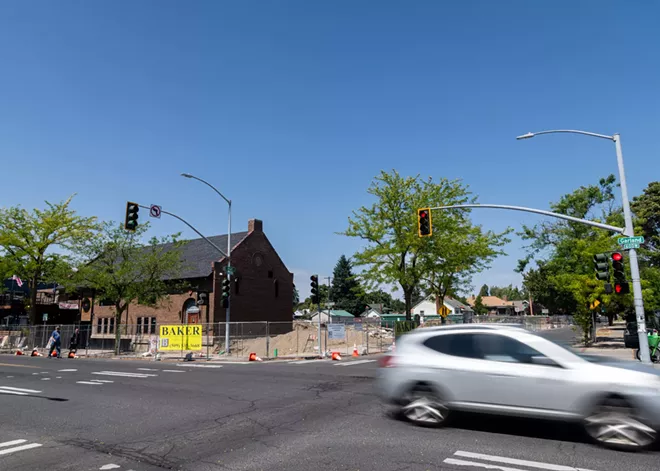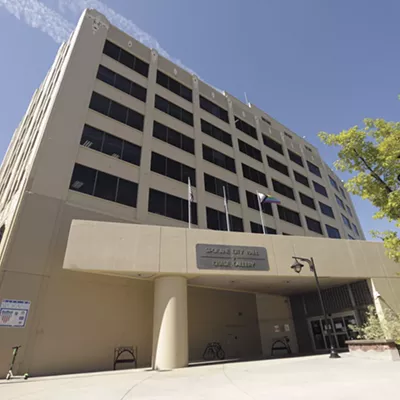
Last summer, Spokane was in a state of emergency.
An unprecedented population boom and influx of new arrivals during the pandemic had squeezed the city's housing market to the breaking point. Home prices soared 60 percent in just two years, and many people saw their dreams of home ownership slip away.
As rental prices and visible homelessness soared, Mayor Nadine Woodward declared a housing emergency.
Spokane needed more houses. But where to build them? Sixty percent of the city was zoned for detached single-family homes, and 23 percent didn't allow any residential construction.
In July 2022, city leaders decided to do something radical: Make it legal to build multifamily housing almost anywhere.
Urbanists have long pushed for an end to single-family zoning restrictions, which limit development to a single unit of housing per parcel of land. Other cities in Washington had flirted with the idea but got bogged down in public process and bureaucratic hoops. Some had achieved minor reform — legalizing fourplexes near transit or parks, for example — but nothing on the scale of what Spokane was proposing.
"When you're facing a crisis, it does require bold action," says City Council member Michael Cathcart. "We had sort of played with the edges of our code for a decade or longer, and I think folks finally realized, 'Hey, we've got to do something substantial.'"
The Building Opportunities and Choices for All initiative — BOCA for short — was passed as an emergency, one-year pilot program. It effectively ended single-family zoning restrictions citywide and made it legal to build duplexes, fourplexes and townhomes in any residential area.
It was a bit of a leap of faith.
"We didn't really know what to expect," says Spencer Gardner, the city's planning director.
Despite some apprehension over unintended consequences and a rushed process, the City Council passed the emergency ordinance 7-0 with support from the mayor's office.
"I think we should try it and see what it does," Council member Karen Stratton said on the night of the July 2022 vote. "We know we're having a housing crisis... I'm willing to take that chance to see where it takes us."
One year later, proponents say the law has been a success. The emergency ordinance won a state planning award and attention from cities in other parts of the country. This spring, the state Legislature passed a "missing middle" bill that essentially requires large cities across the state to do the same thing Spokane did.
"This is literally a case of Spokane leads and Washington follows," Cathcart says.
The city is currently working on a permanent version of the interim law that should be finalized by the end of the year.
The city has passed a number of other housing reform measures over the past year — like an expanded multifamily tax exemption passed last July — that also aim to encourage more housing. Between January and June this year, the city issued 509 multifamily and mixed-use housing permits. That's more than any other year on record — and the year's only halfway done.
Spokane's housing crisis is far from solved, and the new pro-development laws haven't been without critics. But Gardner and other proponents of housing reform argue that Spokane is on the right track, and that a city of diverse, attainable housing is within reach again.
DUPLEXES EVERYWHERE
Over the past year, permits for 70 new units of housing were processed as a direct result of BOCA.
Twenty-one new duplexes. Five fourplexes. Two new detached houses and five new townhouses on individual parcels. One single-family home conversion to a duplex.
"I'm pleased that the number is not zero," Gardner says. "It tells me that there is some demand for these types of housing in the community."
Gardner says 70 units is a great start, and that he hopes to see more in the future. Cathcart agrees. He says some developers were wary of committing to projects under a one-year pilot ordinance, and that he expects a big uptick in permitting after the changes are made permanent.
When BOCA passed, some people expressed concern about single-family homes being torn down to make way for fourplexes. But Gardner says prohibitive demolition costs have resulted in a majority of the new development occurring on vacant lots. The new permits are also scattered evenly across the city — not concentrated in a single neighborhood.
"No one single neighborhood has seen a monumental, catastrophic change," Gardner says. "We haven't radically shifted the housing market in terms of disruption to individual neighborhoods or anything like that."
Spencer says the permanent version of the zoning changes — titled "Building Opportunity for Housing" — is going to have some minor tweaks. But overall, he expects to be largely the same as BOCA.
On Monday, the City Council unanimously approved a series of changes to Spokane's comprehensive plan that make up the first phase of the permanent version. Phase 2 — a series of code changes — is expected to be finalized by December.
The statewide "missing middle" law gives cities several years to update their laws and comply with the new zoning requirements. But while many other cities are now scrambling to catch up, Spokane's missing middle law already covers most of the bases.
"We were forward thinking," Cathcart says. "We're going to be in compliance before the end of this year."
NEIGHBORHOOD CHARACTER
Not everyone is happy with Spokane's missing middle law.
While seeking public feedback on the comprehensive plan changes, the planning department heard from a number of people who are concerned about the city's outskirts lacking infrastructure to support development.
On Five Mile Prairie, for example, a plan to build seven fourplexes under BOCA has been met with significant pushback from neighbors concerned about a lack of road, transit, school and fire infrastructure.
Neighbors are actively appealing the city hearing examiner's decision to approve the project. Former City Council member Candace Mumm, who testified on behalf of the appeal, says she has concerns about both BOCA and the statewide "missing middle" law.
"I think this was done a little hastily," says Mumm, who was on City Council from 2013 to 2021. "I really hope that they continue to refine it."
Mumm says she would rather see an emphasis on dense development near the city's centers and corridors, where robust infrastructure is already in place. She argues that the outskirts development allowed under BOCA requires expensive taxpayer spending on new roads, fire stations and other services.
Gardner understands where those concerns are coming from. But he says that, while some outlying areas have long been marked by a rural character, they're within city boundaries and subject to state laws treating them as an urban development.
He adds that there are mechanisms in place to ensure infrastructure is in place before new development goes forward, and that shutting down construction can actually hinder infrastructure, as developers are often on the hook for improvements.
Cathcart agrees.
"It's a very complicated issue in some of these outlying areas," Cathcart says. "But in my opinion, at the heart of the policy, I don't think it's fair that wealthier neighborhoods are able to have different rules than less wealthy neighborhoods."
Several commenters opposed to the Five Mile development also claimed that apartments would bring crime, the "less than favorable side of society" and lower property values. The city's planning department tactfully referred to those concerns as related to the "integration of diverse economic households."
Former City Council President Ben Stuckart, who served with Mumm and now works as executive director of the Spokane Low Income Housing Consortium, is less diplomatic.
"If we actually gave a crap about our fellow community members, everybody would be jumping up and down begging for more density, because that drives home prices down," Stuckart says. "Mixed income neighborhoods make for better neighborhoods."
PARKING AND PAVEMENT
BOCA isn't the only big pro-housing law to come through Spokane over the past year.
Last June, the city loosened restrictions to make it easier to build accessory dwelling units — sometimes called "in-laws" — on single-family lots. The ordinance increased the maximum size of dwelling units and removed the requirement that property owners who want to build one live on the site.
Permit data shows a modest uptick in dwelling units: 42 were issued in 2022, compared to 27 in 2021.
In February, the City Council passed the "Pavement to People" ordinance, which uses tax breaks to incentivize developers to build affordable housing on downtown surface parking lots.
So far, Gardner says one developer has come forward to take advantage of the incentive.
Cathcart says he considers that a success. He says that while he voted for the ordinance, he frankly didn't think the incentives would be strong enough to attract any developers.
Stuckart says it's time to swap out the carrot for a stick and start charging outrageous fees until the property owners give up on their "immoral" use of downtown land.
Last month, the Spokane City Council also passed a law removing the requirement that developers construct parking spots when building new apartments or houses. The law removed those requirements for all developments within a half-mile of transit stops.
Anthony Gill, who runs the urbanist website Spokane Rising, is a big fan of that new law. He says studies have shown that off-street parking requirements can significantly increase rent and home prices. He wants the city to further whittle down its parking space rules.
"I want to get to a place where we don't have parking requirements at all in Spokane, even for commercial" zones, Gill says. "I think it's crazy that we have parking requirements... You have to build parking stalls for bars, which is just wild to me."
Like BOCA, the parking ordinance is a one-year pilot program that will be made permanent if successful.
Gardner says the planning department is also working on a plan to encourage more high intensity development around the newly opened City Line.
GOODBYE DENSITY, HELLO INTENSITY
The comprehensive plan updates passed by the City Council on Monday are largely big-picture changes that aim to remove language that conflicted with the goals of BOCA. The original language, Gardner says, created "unresolved conflicts."
"It's not that they were bad policies," Gardner says. "It created a tension in the plan that never really got resolved. And in the context of the housing crisis, that tension became more apparent."
One value statement in the original plan called for "protecting the character of single family neighborhoods." The new version passed Monday replaces that line with "celebrating the uniqueness of each neighborhood while allowing for growth and diversity everywhere."
The new version of the plan also replaces the word "density" with "intensity."
Spencer says that density just refers to the number of units per acre, "intensity" captures other important factors like height, mass and how buildings interact with the environment around them.
The update also replaces arcane terminology in the comprehensive plan with four new land use designations.
At the bottom of the new scale is "residential low," which allows for traditional single-family homes, duplexes, fourplexes, townhomes and accessory dwelling units. Nonresidential buildings — like churches, grocery stores, schools and other small retail spaces — are also allowed on a conditional basis.
"Residential increased" areas allow for larger buildings and more commercial space. "Residential moderate" areas, intended to be within walking distance of the city center, allow for larger apartments and condo complexes.
The last classification is "residential high." Picture the areas just outside downtown that have high-rise apartment towers.
It all fits into the broader theme, Gardner says. More choices. More freedom. Housing of all types that meets people's needs and budgets.
Before Gardner's appointment in January 2022, Spokane spent four long years without an official planning director.
Cathcart, Stuckart and Gill are all quick to credit Gardner for Spokane's recent housing progress.
"I would put this victory solely on Spencer Gardner and the community members that pushed to hire Gardner," Stuckart says. "He's the exact right person for the job right now."
Gardner himself is modest. "There's always more we can be doing," he says. ♦


























